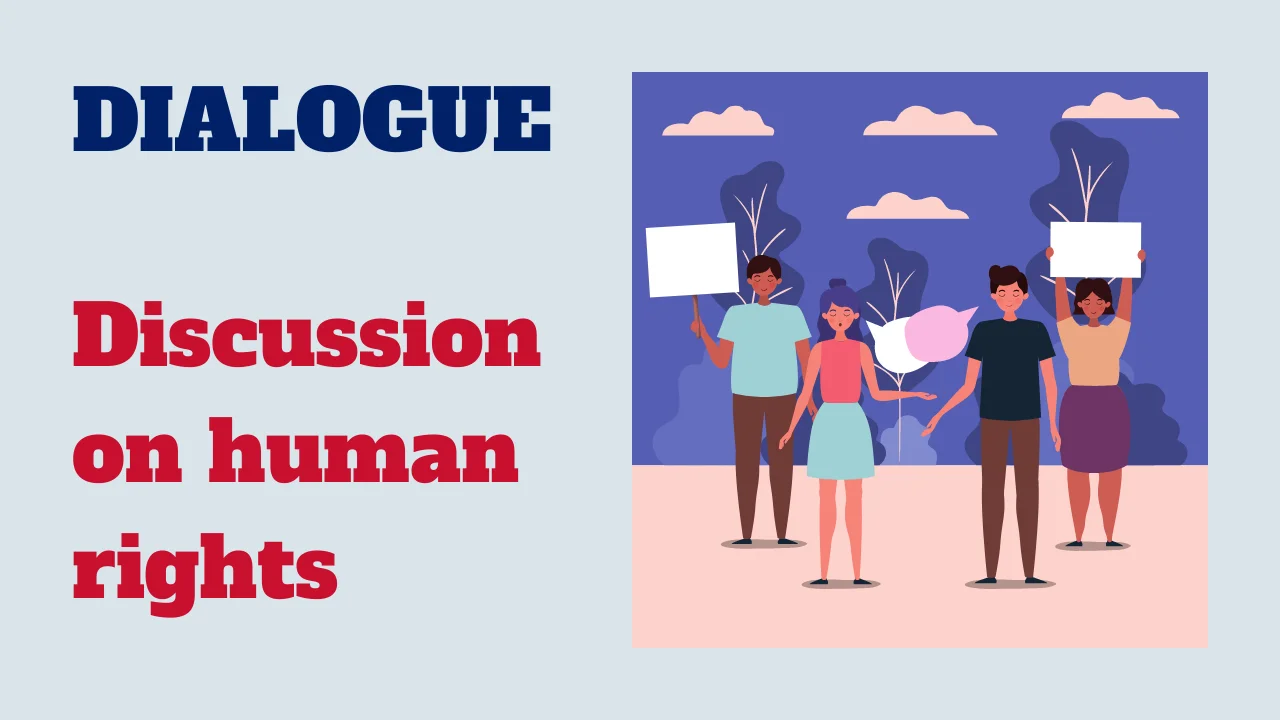Embark on a discussion on human rights with this dialogue. Whether debating the universality of human rights, addressing violations and injustices, or advocating for equality and dignity, this conversation between two individuals will help you build your vocabulary related to human rights issues and the importance of protecting fundamental freedoms.

Listen to the dialogue
Dialogue: Discussion on human rights
Participant 1: Good afternoon! I’m eager to delve into this discussion on human rights with you. It’s a topic that’s central to our shared commitment to justice, dignity, and equality for all individuals.
Participant 2: Good afternoon! Likewise, I believe that human rights are the cornerstone of a just and compassionate society. They embody the principles of fairness, freedom, and respect for human dignity, regardless of one’s race, religion, nationality, or social status.
Participant 1: Absolutely. However, the concept of human rights can be complex and contested, especially when it comes to issues of cultural relativism and differing interpretations of rights. How do you navigate these challenges in your advocacy work?
Participant 2: It’s true that cultural differences and varying perspectives can shape how human rights are understood and implemented in different contexts. However, I believe that certain rights, such as the right to life, freedom from torture, and freedom of expression, are universal and non-negotiable. While we must respect cultural diversity, we cannot compromise on fundamental human rights principles.
Participant 1: I agree. Upholding universal human rights standards is essential for promoting accountability, justice, and dignity for all individuals. However, it’s also important to recognize the interconnectedness of human rights and address issues of intersectionality, where individuals may face multiple forms of discrimination based on factors such as gender, race, or disability.
Participant 2: Absolutely. Intersectionality underscores the importance of taking a holistic approach to human rights advocacy, addressing the root causes of discrimination and inequality, and amplifying the voices of marginalized and vulnerable communities. By recognizing the interconnected nature of rights and working collaboratively across different sectors, we can create more inclusive and equitable societies.
Participant 1: That’s an excellent point. Human rights advocacy requires a multidisciplinary and intersectional approach, involving collaboration among civil society organizations, grassroots movements, governments, and international institutions. By working together and mobilizing collective action, we can hold perpetrators of human rights violations accountable and advance the cause of justice and equality.
Participant 2: Absolutely. At its core, human rights advocacy is about empowering individuals to claim their rights, challenge injustice, and create positive change in their communities and societies. By standing in solidarity with one another and upholding the principles of human dignity and equality, we can build a more just and inclusive world for present and future generations.
Participant 1: Well said. It’s been a thought-provoking discussion, and I’m grateful for the opportunity to explore these important issues with you. Let’s continue to champion human rights, advocate for justice, and work towards a world where all individuals can live with dignity and equality.
Engage in a discussion on human rights with this dialogue. Practice your English language skills while exploring topics such as universality, cultural relativism, intersectionality, and advocacy strategies. Whether reflecting on the challenges of promoting human rights or brainstorming solutions for advancing justice and equality, this conversation provides a practical scenario for language learners to engage in discussions on human rights issues and the importance of upholding fundamental freedoms. Happy discussing!



